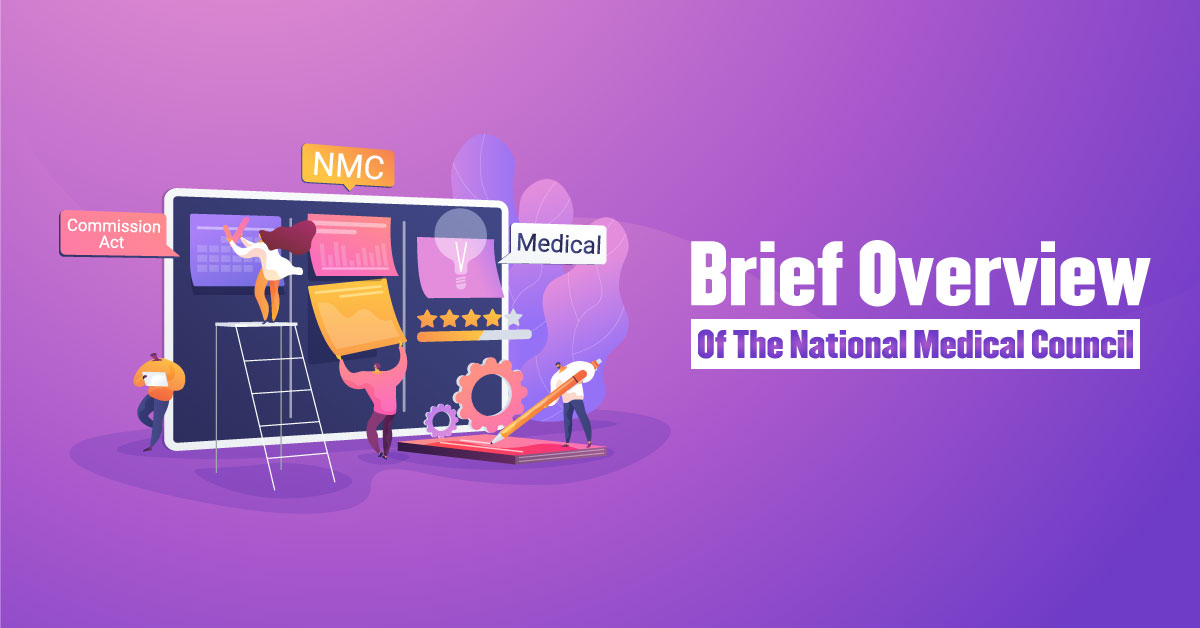An Indian Medical student being unaware of NMC is like an Indian citizen being unaware of capital Delhi. If you don’t want to be in that category of people or if you already are conscious and aware but want to explore more, scroll through the article, for everything known for once unknown.
This article covers, as the title says, everything about NMC.
Constitution
The Medical Council of India was a statutory body for establishing uniform and high standards of medical education in India till 25 September 2020. On 25 September 2020, it was replaced by the National Medical Commission.
The National Medical Commission (NMC) has been constituted by an act of Parliament known as the National Medical Commission Act, 2019 which came into force on 25.9.2020 by gazette notification dated 24.9.2020.
Objective
The Aim of the National Medical Commission is to:
- Improve access to quality and affordable medical education.
- Make services of medical professionals accessible to all the citizens.
- Promote equitable and universal healthcare.
- Contribute to medical research and adopt the latest technology in their field of work.
- Assess medical institutions periodically in a transparent manner.
- Enforce high ethical standards in all aspects of medical services.
- Have an effective grievance redressal mechanism.
Autonomous Boards
NMC frames policies and coordinates the activities of four autonomous boards. Each autonomous board consists of a president and four members, appointed by the central government. These boards are—Under-Graduate Medical Education Board (UGMEB), Post-Graduate Medical Education Board (PGMEB), Medical Assessment and Rating Board (MARB), and the Ethics and Medical Registration Board (EMRB).
Functioning
The functions of the National Medical Commission are to:
- Lay down policies and make necessary regulations for regulating medical institutions, medical researches and medical professionals to fulfill the above objectives.
- Assess the requirements in healthcare in the country and develop a road map to meet those requirements.
- Ensure the proper functioning of the Commission, the Autonomous Boards and the State Medical Councils.
- Take measures to ensure compliance of the guidelines and regulations framed under the NMC Act by the State Medical Councils.
- Exercise appellate jurisdiction with respect to the decisions of the Autonomous Boards.
- Formulate codes and policies to ensure observance of professional ethics in the medical profession.
- Frame guidelines for determination of fees and other charges in respect of fifty percent of seats in private medical institutions which are governed under the provisions of the NMC Act.
It exercises other such powers and performs functions to ensure quality healthcare facilities in the country.
Updates
You can check out their latest updates on their official website.
Wrapping Up
The NMC Act will hopefully bring in much-needed reforms in the medical education sector.
According to the government, NMC will:
- reduce the burden on students
- ensure probity in medical education
- bring down its costs, simplify procedures
- help to enhance the number of medical seats in India
- ensure quality education
- provide wider access to people for quality healthcare.
One thing can be stated for sure, there would be an array of opportunities for Indian medical students in the upcoming future.





